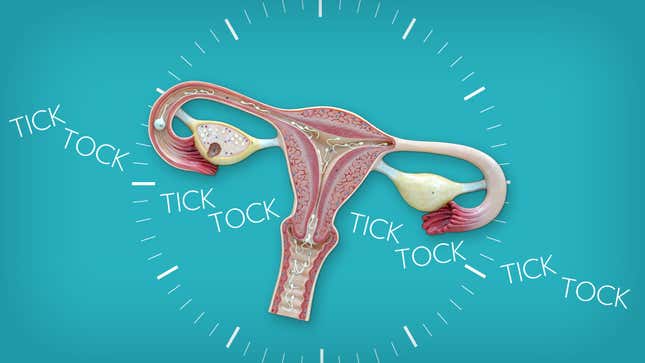Have Scientists Finally Figured Out How to Turn Off Our Biological Clock?
Latest

If your first period signals the official “start” of your usefulness as a baby vessel, then menopause is the long, slow death wail of your fertility. No matter how much money you throw at your uterus, if your ovaries go menopausal it’s all systems no on mission pregnancy. Or, at least, it used to be. Everything might be about to change, thanks to new research that’s found that by harvesting your ovarian tissue before it goes kaput, freezing it, and then grafting it back onto your ovaries years later it’s possible to undo menopause and keep your fertility going for far longer than nature would have allowed. Obviously, that’s pretty cool, but it could also change life as we know it. Are visions of 80-year-olds clutching their newborn babies already crowding your head?
These futuristic sounding findings were delivered at a conference held by the European Society for Human Reproduction and Embryology in Istanbul this week. Doctors made the case that this ovarian tissue transplant should be moved from being an experimental treatment to being a mainstream option for all kinds of patients. Thus far, 28 babies have been born to mothers who received transplanted ovarian tissue and would otherwise have been infertile. Most of the pregnancies occurred naturally, with no IVF involved. While other researchers have been working on hatching eggs from ovarian stem cells in the lab, this kind of direct tissue transplant is a simpler alternative that has the power to extend a woman’s own fertile period.
This transplant technique was first reported on eight years ago, yet it has remained experimental and has only been done by a few specialists. But evidence is growing that this is a practice worth expanding. One piece of proof was presented at the conference by Dr. Gianluca Gennarelli from Clinica Universitaria Sant’Anna in Turin, Italy. The case involved a 21-year-old woman who in 2003 was diagnosed with cancer and was set to receive fertility-destroying chemotherapy. Some of her ovarian tissue was collected using laparoscopic surgery. It was then frozen and stored in liquid nitrogen. She underwent the chemo and, as predicted, became infertile. In 2010, she was ready to have children, and so they sewed 32 fragments of her thawed tissue back onto her ovaries. After two months, some of her ovarian function returned. Then she began having menstrual cycles and ovulating. Fifteen months after the transplant, she became pregnant without any additional medical intervention. She gave birth to a healthy baby in March of 2012. That is pretty amazing.
According to Dr. Sherman Silber, a surgeon at St Luke’s Hospital in St Louis, Missouri, who has been involved in 11 of these transplants, this technique is “robust”—since in some cases transplants done eight years ago are still working—and should no longer be considered experimental. He says, “It’s really fantastic, we didn’t expect a little piece of ovarian tissue to last this long.” Fantastic and a little freaky, since this is kind of like a little tiny ovarian fountain of youth.
-

-

-

-

-

-

-

-

-

-

-

-

-

-

-

-

-

-

-

-

-

-

-

-

-

-

-

-

-

-

-

-

-

-

-

-

-

-

-

-








































